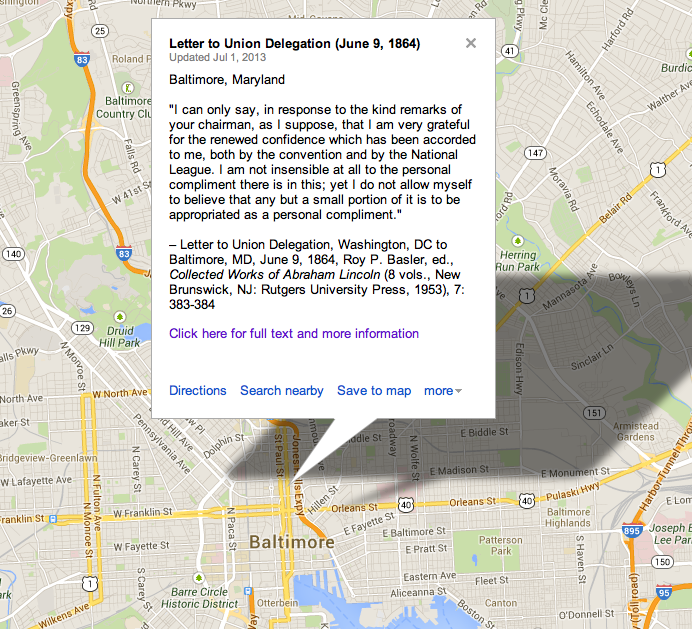Contributing Editors for this page include China Harvey and Rhonda Webb
Ranking
#90 on the list of 150 Most Teachable Lincoln Documents
Annotated Transcript
On This Date
Close Readings
Posted at YouTube by “Understanding Lincoln” participant China Harvey, Summer 2016
Posted at YouTube by “Understanding Lincoln” participant Rhonda Webb, September 28, 2013
Custom Map
How Historians Interpret
“Lincoln told a deputation from the Radical-dominated National Union League which informed him of that body’s endorsement: ‘I am very grateful for the renewed confidence which has been accorded to me, both by the convention and by the National League. I am not insensible at all to the personal compliment there is in this; yet I do not allow myself to believe that any but a small portion of it is to be appropriated as a personal compliment. The convention and the nation, I am assured, are alike animated by a higher view of the interests of the country for the present and the great future, and that part I am entitled to appropriate as a compliment is only that part which I may lay hold of as being the opinion of the convention and of the League, that I am not entirely unworthy to be intrusted with the place I have occupied for the last three years. I have not permitted myself, gentlemen, to conclude that I am the best man in the country; but I am reminded, in this connection, of a story of an old Dutch farmer, who remarked to a companion once that ‘it was not best to swap horses when crossing streams.’”
— Michael Burlingame, Abraham Lincoln: A Life (2 volumes, originally published by Johns Hopkins University Press, 2008) Unedited Manuscript by Chapter, Lincoln Studies Center, Volume 2, Chapter 32 (PDF), 3640-3641.
“Aware of the undercurrent of opposition to him, Lincoln in response to delegates of the Union League quoted a remark of a Dutch farmer that ‘it was not best to swap horses when crossing streams.’ In his reply to the committee notifying him of his renomination, he singled out the proposed constitutional amendment as a ‘necessary conclusion to the final success of the Union cause.’ To his disappointment, the House in a partisan vote failed to muster the two-thirds majority needed to dispatch the Thirteenth Amendment, approved by the Senate, to the states for ratification.”
James A. Rawley, Abraham Lincoln and a Nation Worth Fighting For (Lincoln: University of Nebraska Press, 2003), 192.
NOTE TO READERS
This page is under construction and will be developed further by students in the new “Understanding Lincoln” online course sponsored by the House Divided Project at Dickinson College and the Gilder Lehrman Institute of American History. To find out more about the course and to see some of our videotaped class sessions, including virtual field trips to Ford’s Theatre and Gettysburg, please visit our Livestream page at http://new.livestream.com/gilderlehrman/lincoln

